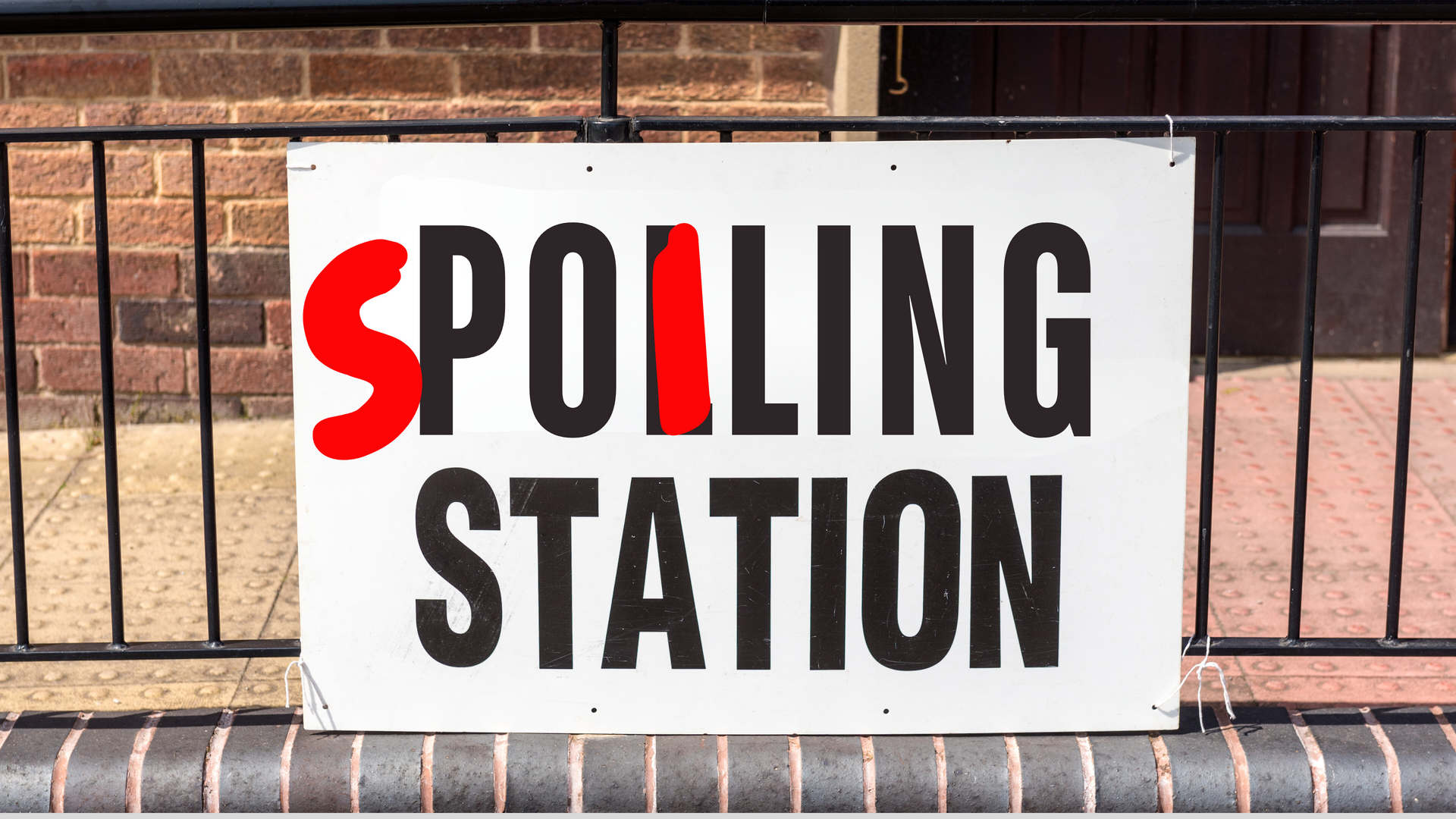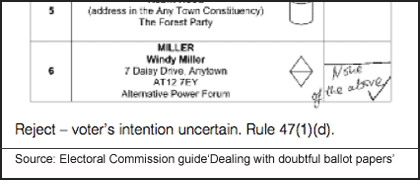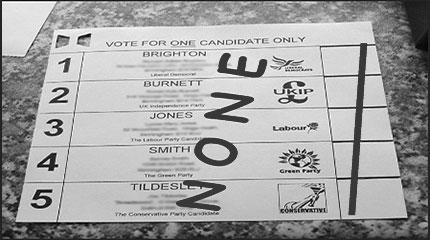The Coming Election

Boxing Clever at the Polling Station?
Mark Rendell, 12 June 2024
Our Parliamentary democracy no longer works. It seems as though the major systems of governance, our Executive and Parliament have gone rogue, forgetting who is truly sovereign and who they actually work for. A significant number of people have disengaged from politics at any level and far too many of our elected representatives operate from a sense of entitlement and unassailability. This is a dangerous situation that leaves the populace’s voice neutered and ineffectual, and, in the absence of robust checks and measures, we effectively have a State apparatus that is increasingly beholden to outside interests. A malaise has set in, neither side inclined to do anything about this Status Woe.
How can we reverse this situation and bring back accountability and moral leadership? More importantly, how can we re-engage people when many sense the system is rigged against the change that is truly needed? Is it even possible to reform Parliament and our other national institutions to serve the people fairly, justly and democratically? The task is seemingly insurmountable.
There is a loophole that could be exploited…
The place to start though, surprisingly, is in my opinion at the voting booth. One way we can attempt to correct matters with minimal outlay and organisation is to exploit a simple legal loophole in the electoral voting systems in the UK: they have to count a spoilt ballot (1). This means that this type of vote matters, if enough of us do it across each constituency.
Currently, elected representatives want disillusioned people to stay at home and not vote at all. They don’t care about an ever-reducing percentage of votes for their candidates. It simply doesn’t matter to them any more about the erosion of legitimacy that this creates. They have factored in the disengagement and are depending on people remaining glued to their sofas, desks or beds on election day. Sophisticated polling and computer programmes compiling past voting intentions create surprisingly detailed insights in each constituency allowing the mainstream, well funded parties to deploy their resources efficiently and their messaging to best effect locally.
But this modelling makes many assumptions too. And one of these is that there will be no change in the voting habits of the roughly one-third of registered voters who do not vote. Here is the weakness we can exploit. If we can mobilise even a small fraction of these voters then we can wreck the carefully laid plans of the establishment parties and, as I will explain in a moment, steal a march by harnessing this anti-vote into a positive force for change at the constituency level, after the election.
In many constituencies, the number of voters who have registered to vote but did not go to a polling station is significant. They could make the difference between a genuine political upset and the momentum necessary to bring some unpredictability back to the electoral process. In Halifax, for example, in 2019, more than 25,000 registered voters (more than a third of the total) did not cast their vote (despite being registered to do so) and yet the majority won by the MP was just over 2,500, one-tenth of the size of the number who stayed at home. (2) This is illustrative of just how finely balanced many elections are across the UK. It does not take much to really upset the apple cart.

Why is spoiling the ballot the right approach?
Spoiling the ballot paper is a positive way to channel the pent up anger, disaffection and disgust that many people rightly feel about the political system in the UK. It is also legal and anonymous. Many people still believe they should vote so it provides a valid ‘baby step’ for those who would never consider themselves protesters or anti-establishment to re-engage with crucial matters relating to how they wish to be governed. The promotion of spoiling the ballot could then be seen to be doing a service for democracy as a whole by at least encouraging people to turn up and vote (even if it is for none of those on the paper).
The problem is that we don’t have an accurate understanding of the degree of disillusionment (and thus support) for a new way of organising our society and therefore a clear and inarguable mandate to act to initiate change from the old to the new. We need therefore to convert anecdotal knowledge and observations (about the groundswell for change) into a self-evident and measurable mandate for change. For this to happen, we need the need for change to be obvious to a majority of people. This is where we co-opt the current voting system and exploit the loophole of spoiling the ballot. If enough people visit the polling station on election day to register their disenchantment, disgust and disillusionment via a spoilt ballot then this provides moral legitimacy to act on this ‘mandate’ from the people themselves.
“You never change things by fighting the existing reality. To change something, build a new model that makes the existing model obsolete.”
- Buckminster Fuller
Reaching out to genuinely Independent candidates
This shifts the voting narrative from a party in search of an electorate to an electorate in search of a party. Activating the vote and then responding positively with this desire for change by setting up a party that can best represent them is thus fulfilling Buckminster Fuller’s nostrum for overcoming the status quo and attacking the corrupt elite from their blind spots. We harness the spoilt ballot totals (along with any Independent party totals) into a mandate post facto to either: 1. set up a local Independent party to represent this group (and the wider electorate) or 2. augment the existing Independent party infrastructure. This approach also saves a huge amount of upfront money in marketing and promotion and registration fees for candidates until a mandate provides clear evidence that it will be money well spent.
We are effectively running a parallel vote, piggy-backing on the established voting system, delivering a verdict on it through an ‘anti-vote’, a spoilt ballot paper. We are actually encouraging greater participation in the voting process, in order to undo it. We can now answer the question, “What’s the point of going to the polling station?” We will set up a party to represent you, if enough of you vote for change. And we counter the familiar refrain, “My vote won’t make a difference” by pointing out just how few people currently registered to vote but who don't can make a big difference.
And who knows, maybe traditional mainstream party supporters may be tempted to spoil their ballot paper too? The Chester by-election in 2022 (3) was an example of Tories staying at home. Promoting the option of allowing them to protest by spoiling their paper (they were unlikely to vote for anyone else) may well have got many hundreds more to the polling station and could have created a genuine upset at the polls if they had spoiled their ballot.
How do I spoil the ballot paper?
For your spoilt ballot to be counted in the current system, it will need to be ‘rejected’. The Electoral Commission's guide (4) for those who count the votes requires that rejected votes be classified and counted under four reasons for rejection:
- absence of official mark [polling station stamp];
- voting for more than one candidate;
- writing or mark by which the voter could be identified;
- unmarked or void for uncertainty.
The best advice would be to write your message over the names section and put a line through ALL the boxes. This would mean that the returning officer is likely to classify your spoilt ballot as either (and ironically), 1. Voting for more than one candidate or 2. Void for uncertainty. Both of which are not a true reflection on your voting intention but is the way we game their system.
The examples given in the guide document include a protest vote (below) where the voter has written 'None of the Above' with a tick. The advice given in the Guide is to classify it as 'voter's intention uncertain'.

(Credit for cropped pic: votenone.org.uk)
One option is to write NONE across the ballot paper, so that your intention is clear and beyond dispute (even if it will be recorded as rejected). Note the line going through every box. I would say to be imaginative and make a clear statement. But avoid being provocative or the use of swear words - remember that someone will be reading your ballot.

(Credit: votenone.org.uk)
What happens after the election?
If sufficient spoilt ballots are counted and throw the validity of the ‘winner’ into doubt or even represent a ‘win’ in any given constituency, then that needs to trigger the process of mobilising local, grassroots groups to form or unite to build on an independent political movement and party that begins the process of transferring power from the old, corrupt system to a new and better one, based on agreed principles and values and customised to each constituency. This process will have received legitimacy from the people undertaking a right to vote in their locality. This action cannot be thwarted except by extremely authoritarian means and, if attempted, simply validates the ethos of the spoiling the vote campaign in the first place.
What needs to happen before Election Day?
Whilst each constituency has a different dynamic in terms of incumbency and popularity of mainstream parties and number of registered freedom or independent parties, work ahead of an election is essential to raise awareness of the option to spoil the ballot. There is now a great deal of momentum by very many alliances and groupings that are developing capacity locally and from the grassroots upwards to effect change and the creation of a parallel societal structure. Could these groups co-operate politically to harness the momentum and mandate that a spoilt vote mandate would give their work? If this can be done before the election then this gives a valuable lead in capitalising on the likely shock and disorientation that such a result could create and activate the next steps to establish the narrative of change being signalled from the disaffected.
Immediately, the new political grouping needs to agitate the participants in the voting to join an unaligned, independent movement for change, to register a new party locally (or to realign an existing one) and to identify potential candidates to become MP in waiting. Canvassing can take place on the doorstep and via local media to announce the new party and the pressure to be applied for a re-election at the next available opportunity. This approach can also be deployed at other elections at county and district level, the intention being to support and vote in truly independent and non-aligned representatives. If there is an independent political group locally, then they could be sounded out for expanding their focus to include the mandate that will be provided by the spoilt ballot vote.
What needs to happen on Election Day?
Create a momentum and a buzz around the spoil the ballot paper activity by encouraging people to vote early (from 7.00am), take a photo of their spoilt ballot before posting and then upload it to social media with hashtags that might include their constituency name along with examples such as: #NOTA!, #spoiltheirparty, #Idonotconsent, #Goonspoilme, #Noneoftheabove etc. This may well encourage many more people to go the extra mile and wander down the polling station later in the day and make a work of art of their spoiled ballot too. Another outcome of doing this is that a rolling total of spoiled ballots are being recorded via social media that should correlate to the ‘rejected’ total that will be counted subsequently. It could also be possible to make placards and stand at the polling station mentioning the option to spoil the ballot on the day.
Obviously, setting in place the groundwork for these types of activities will need to be done in the weeks and days leading up to election day and this could be a priority activity for the fledgling political grouping that may need to form in the constituency.
Could the PHA, PFFA, Independent Alliance, Light Paper, Council Watch groups, Together, National Residents’ Association, Community Assemblies, Low Impact Forum, The Great Rising, Holistic Alliance for Real Ecology, The Great Resist networks and many other local ones, aid in this effort?
Key outcomes that can be anticipated from a big spoil the ballot result
If sufficient spoilt ballots are counted in each constituency then they have the power to do the following:
1. Provide inarguable evidence that the old system isn’t working
- We the people have effectively co-opted the current voting apparatus to inform the System that we want change (and we are prepared to do this ourselves).
- Where the percentage of spoilt ballots are significant, this can provide the trigger for local organisation to represent these voters (by bypassing elected officials and setting up a new party or official opposition)
- Means that the levels of dissatisfaction / disaffection in current electoral and governance practices are measurable and cannot be dismissed
2. Upset the balance of power
a. A significant number of people who attend a voting station but do not vote for any of the offered candidates will detrimentally affect the results for all candidates. This could result in the unseating of traditionally invincible parties and potentially alter the political landscape. At the very least, this will involve serious reflection by the main parties.
b. Puts our elected representatives on notice that they cannot take their electorate for granted.
c. May result in chastened elected representatives that remember that they serve their local constituents first.
3. Create a mandate for local efforts to create or demand change
a. Local grassroots organisations and campaigns can capitalise on the mandate that a significant spoilt ballot result gives by organising into a legitimate representative local committee or party.
b. May provide an argument for a recount or a re-election in contested seats where the percentage of spoilt ballots are very high
c. Will result in a boost in confidence that the ordinary person has caused the system to take pause and even be humiliated. This may result in more people becoming interested in local politics.
“What if the spoiled ballots percentage is the highest?”
The most that can be achieved is for the percentage of spoiled ballots to gain the most support (even if this results in a mainstream party candidate being elected). What this does though is to delegitimise the ‘winner’. In quick order, there needs to be a local meeting of all interested parties who feel that they represent the disaffected voter and mobilise into an electoral force to consider:
a) inviting the elected representative to remove the party whip and represent the constituency as an independent MP,
b) putting the newly elected representative ‘on notice’ to deliver on the identified needs of the local constituency within a specified period of time or apply pressure to hold a vote of no confidence (may require infiltration of the local party to achieve this),
c) Use the results as a mandate to create a new political party that addresses local needs and the desire for root and branch change.
“What if the spoiled ballots results are ignored?”
It doesn't matter if the electoral system chooses to ignore a big spoilt ballot vote (they will anyway). We have used their voting mechanism to give ourselves the mandate to organise for change locally. The message is for us not for them - this is the mandate we take to form local representation, bringing together local alliances and grassroots groups.
“What if there are already candidates on the voting slips that will deliver change?”
Then it makes sense to support them. Research all prospective candidates, ask them questions. Establish their alignment with your values and priorities. Some mainstream party candidates have done amazing things and some new party candidates promise to address all the challenges that many of us have identified. Additionally, some candidates could also enter into a quid pro quo arrangement and recommend that electors spoil their ballots if they are not inclined to vote for them. This needs to be considered on a constituency by constituency basis.
“Could the losing candidate contest the result if the number of spoilt ballots call into question the legitimacy of the winning candidate?”
Yes, and this should be encouraged. Create doubt in the mandate given and support calls for a re-election or a recount. Consider aligning with the winning candidate if they renounce their party affiliation and commit to addressing identified local needs and the desire for change nationally. Consider aligning with the losing candidates to form a mega-opposition that will put pressure on the elected representative to address local issues.
“Could this detract from other campaigns that have advocated spoiling the ballot or the addition of more choices on the ballot slip?”
There is a ‘chicken and egg’ situation here. The evidence for changing selection criteria to include additional choices to the candidates standing may be better supported by a campaign that demonstrates the desire for change among the electorate. An active and coordinated spoil the ballot campaign would probably raise the chances of a NOTA option (for example) to be added by the electoral commission / oversight body. At the moment it could be argued that there are insufficient incidences of spoiling the ballot to warrant inclusion. What better way than a campaign such as this to do this in a massive way?
Summary / Selling Points:
Spoiling the ballot on a large scale would achieve several outcomes (at both constituency and national levels):
a. sends a message to each other that there are many of us out there (we basically co-opt their mechanism for giving them legitimacy and a mandate to govern, for ourselves), we build confidence and solidarity
b. sends a message to our elected representatives that there is a groundswell of dissatisfaction that is mobilising into positive action (it will worry them and may make them more chastened - unlikely but the anonymous nature of the vote will make it hard for pollsters to work out what the inscrutable electorate are up to)
c. could disrupt the election of either of the two main candidates by splitting votes and reducing majorities (this could be achieved with relatively few spoiled ballots in swing seats)
d. could provide the mandate that we the people interpret as sufficient to warrant:
i) the setting up of a non-aligned 'party' locally to identify local priorities and govern in parallel, forcing a question mark over the legitimacy of the so-called elected rep,
ii) become a strong opposition to the elected rep,
iii) gather all opposition voices under an umbrella that sets a new agenda that the elected rep has to pursue.
e. Provide hope that there is a mechanism for forcing change, helping re-engage disheartened and disengaged communities to enter a dialogue locally about the kind of local community and wider society they want to live in.
f. calls the bluff of local opposition voices to walk the talk of their visions for the local area - a voter mandate means that they will need to step up and start that process locally
There is a rare confluence at this election between rapid grassroots development and desire for change meeting a zeitgeist for upsetting the political system. The sweet spot will be election day when the electorate meets the elected. By harnessing the anti-vote of spoiling the ballot to a post-election promise to act on this ‘mandate’ and create a party that truly represents the people will send shock waves through the carefully choreographed machinations of those who purport to govern us. We British are nothing if not inventive. Let’s be creative at the ballot box and make an art out of voting in the new.
References:
- https://votingcounts.org.uk/spoilt-ballot
- https://votingcounts.org.uk/2019-non-voters
- https://www.cheshirewestandchester.gov.uk/your-council/voting-and-elections/election-results/2022-elections/city-of-chester-parliamentary-by-election
- https://www.electoralcommission.org.uk/sites/default/files/pdf_file/UKPE-doubtfuls-booklet.pdf
Mark Rendell is a gardener based in North Wales who has a background in community development, project management and training. He is a member of The Great Rising Team and local Stands in the Park.